- Home
- Michael Wallace
The Sentinel (The Sentinel Trilogy Book 1) Page 4
The Sentinel (The Sentinel Trilogy Book 1) Read online
Page 4
The technicians stopped what they were doing and fluttered in alarm to see the queen in all her brilliant plumage. Their eyes stared and their tongues clicked nervously. Ak Ik flapped her wings to spread her scent, and they chittered when it reached their nostrils.
How easy to end this charade. Let her dominant scent take its effect and turn these drones against their mother and toward their grandmother. Ak Ik would set them against each other and return to her own command ship, leaving Sool Em and her brood dead. She would give Sool Em’s remaining warships to another princess. Take her mining colonies and slave broods for her own.
But something caught the queen commander’s eye before she could give this further thought: five bubbling tissue canisters on the far side of the chamber. She strode across the room to see. The first canister held the brain and nervous system of a Hroom, the second an Apex brain—a drone’s, naturally. Like many of Ak Ik’s daughters, Sool Em shared the Apex obsession with genetic manipulation of the species itself.
The final three canisters held human brains and spinal columns. To Ak Ik’s shock, the instrument panels showed a gray triangle, which meant they were still alive. She cocked her head and turned to Sool Em.
“How is this possible?”
“Delicate extraction, Queen Commander. Very delicate. We captured humans and experimented until we succeeded.”
“That has been tried before. Dozens of times, hundreds. The humans always died.”
“It took many attempts,” Sool Em said. “Some time ago, when you were fighting the Albion forces, I captured a fleet of refugees. That gave me many specimens.”
“I never heard of this.”
“It is my right to keep my own prisoners, Queen Commander. To devour them or experiment on them as I see fit. We ate their captains, and kept the rest for the laboratories.”
“Go on,” Ak Ik said. She was intrigued, and a stirring of excitement tingled to her wingtips. “How did you take so many captives? The humans fight to the death or kill themselves. They know what awaits them when they fall into our hands. To capture so many in a human fleet is nearly impossible.”
“We disguised ourselves as human pirates. Infiltrated their forces. Then we used the disruptor and captured the humans while they were in a torpor. I brought them into the labs one at a time. It took several thousand attempts to perfect the technique.”
“That must have taken months.”
“Indeed. Nearly a full standard rotation.”
Sool Em walked up to the tanks, where the human brains and spinal columns floated in nutrient baths. She continued her explanation.
“The human body is fragile, but the human mind more so. Deprive it of its senses and it loses sanity. To isolate a human specimen must be accomplished in stages. First, we strip away the unnecessary tissue, starting with the limbs, and then moving to the internal organs, and finally sight and hearing. To keep them alive and aware during this process is a challenge—they do not always survive the extremes of pain as we reduce the body to a remnant. At last, we extract the brains and spinal columns, and provide just enough electrical stimulation to the brain to keep it rooted in reality.
“Once I learned how to maintain humans in a living state when they’d been severed from their bodies, my specimens suffered additional losses as my technicians worked on their brains. They continue to be fragile things—you can kill or maim or turn them insane if you alter them in the wrong way. But I needed to work directly with the brain, you see, before I could attempt my experiment on a complete human body.”
“Tell me!” Ak Ik cried, unable to hold her excitement any longer. “You’ve broken them?”
“Yes, Queen Commander. I have tweaked my own genetic code to do so. Any queen or princess could do the same, if I share my secrets. It was a costly alteration. You see the loss of control among my drones—temporary, of course, but costly. But I can now secrete the right enzymes. The humans can be controlled.”
“Yes,” Ak Ik said. “Very good. Tell me more. What have you done?”
Sool Em opened her wings to show her brightest colors. “I have sent humans into the enemy fleet. We have brood parasites, Queen Commander. They do my bidding.”
Chapter Four
Captain Jess Tolvern of HMS Blackbeard retreated to her war room to study the report from engineering. She needed privacy, space to think. Seventeen hours had passed since the jump, twenty-three hours since Blackbeard’s mauling at the hands of the enemy. The situation hadn’t exactly stabilized, but if the ship could be compared to a wounded man, they’d at least hooked him up to an IV and machinery to read his vitals.
The information scrolling across Tolvern’s console was uniformly bad. Leak in the secondary plasma engine. Primary laser cannon destroyed. Kinetic batteries heavily damaged. Deck shield nonexistent. Other shields battered. Oxygen leaks from banks three and four, and the entire oxygen plant crippled. Even the warp point engine was down since the jump; there would be no additional jumps until it could be repaired, but that was academic at this point. With the number two plasma engine dying, they couldn’t reach jump velocity anyway.
At least we’re alive.
The same couldn’t be said for HMS Swift. The smaller ship had fought valiantly at Blackbeard’s side as the two ships faced a vicious assault by four Apex lances. Captain Tolvern’s heart raced even now, a full day later, as she recalled the battle.
The two Albion warships had been no easy prey. Retrofitted with Hroom hardware, heavy lasers capable of exploiting a known Apex vulnerability, and using new tactics suggested by the Admiralty, they initially fought the enemy to a standstill.
The human ships were swifter, and in a straight-out sprint, they’d have quickly outrun the enemy. But Blackbeard and Swift needed a fixed jump point, while the Apex vessels darted in and out, firing lasers that cut through the humans’ tyrillium armor like it was made of particle board. Tolvern swerved, changed directions, anticipated the enemy’s jumps.
Once, she got lucky. The Apex ships popped out exactly where she’d guessed. Blackbeard rolled to present a broadside, and fired a powerful barrage from the main battery. One of the slender lances took it full and detonated. Another suffered significant damage. If Tolvern had positioned Swift in a more aggressive posture, the corvette could have hammered the other enemy vessels as they fled. They’d have won the engagement.
Instead, she’d second-guessed herself, had ordered Swift to guard Blackbeard’s flank. Swift swung around to obey Tolvern’s orders, but this left the corvette exposed, away from Blackbeard’s protective guns. The remaining lances pounced on the exposed corvette. The other Albion captain was game, fought bravely, and destroyed the wounded lance, but the other two fell upon Swift like wolves tearing at a wounded moose. They ripped her belly, tore at her flanks, savaged her engines.
Tolvern rushed to rejoin the fight, but didn’t arrive in time. Swift’s rear shields gave way. An engine detonated. Gas and debris vented into the void as the dying corvette streaked across Tolvern’s viewscreen like a comet plunging toward the sun. Even as she broke apart, Swift kept firing off torpedoes and missiles in a last-ditch attempt to influence the battle. Soon, there was nothing left but wreckage, all hands lost.
Blackbeard was already wounded, and fled the battlefield. The remaining two lances pursued.
Sixty hours to the jump point. That’s how long Tolvern had needed stay alive. She’d already sent urgent subspace messages on first contact with the enemy. The reply came shortly after Swift’s destruction:
Help is on the way. Run for the jump point. We’ll meet you there with a full task force.
A full task force meant at least one more heavy cruiser like Blackbeard, together with a flotilla of frigates and torpedo boats. The force might even be accompanied by a pair of Hroom sloops of war; humans and Hroom had formed a recent alliance against their common enemy.
Apex had probably intercepted the communications, both Tolvern’s outgoing call for help and the reply from the
Admiralty. The aliens were capable of breaking any encryption, could pluck subspace messages from the void like fish drawn through a hole in a frozen lake. Yet the remaining enemy craft pursued at a leisurely pace. They targeted Blackbeard’s shields with lasers, but didn’t try to puncture the hull.
Had they been trying to kill her, it would have ended quickly, but they weren’t. They were trying to disable the engines, to take the ship, rather than destroy it. Apex wanted its captives. The aliens fought to prove they were the chief predator of the space lanes, the supreme race of sentient life, and they did so by destroying their enemies, by literally consuming them. Captain Tolvern herself would be the crowning feast of the victory if she fell into their clutches.
Blackbeard was still eight hours from the jump point when the lances vanished, only to appear again off starboard. It wasn’t the first time Tolvern had faced that tactic, and she was ready this time. She rolled and scored a light hit with the belly guns, then disrupted the path of the enemy ships with a barrage of torpedoes. Dropped several small mines. This bought her a few minutes, but the lances soon resumed the chase.
Standing on the bridge with her tense, exhausted crew, Tolvern stared at the viewscreen with growing worry. Reinforcements should have arrived by now.
Where are those damn warships?
Even as this thought came to mind, a ship flashed through the jump point ahead of them. The lances balked; it wasn’t one of theirs. Tolvern ordered Blackbeard onto the offensive. They swung wide. Power was shunted from the warp point engine to the laser batteries.
One lance jumped away, and the other changed direction to steer clear of the jump point. That brought it across Blackbeard’s line of fire. The Albion cruiser fired all guns. Tolvern expected the ship to vanish into the void like the other had, jumping away from danger. Instead, it tried to outrun and outmaneuver the larger, swifter Albion cruiser. Tolvern’s attack must have damaged its jump ability.
The tables had turned. Tolvern overtook the enemy ship and pounded it until its engines broke apart, and the rest of the ship spun away, unable to maneuver. She chased after, eager to capture the first Apex captives alive, but the rest of the ship self-destructed. Tolvern and her crew turned back to study whoever had come through the jump point.
The ship that had jumped through was an unknown vessel. Not Albion, not New Dutch, Ladino, or even Hroom. Nor was it Apex. It sat near the jump point, immobile, refusing all communications.
Tolvern had no choice but to approach. She had to jump out of this system, for one. And while she had no idea if the ship was hostile or friendly, this was definitely a case of the devil you don’t know being better than the devil you know.
What Tolvern learned changed everything.
And nothing, she thought now, seventeen hours after the jump. She sat alone in the war room, reading the grim news from engineering. So much damage, so far from any friendly base. An unknown system, no inhabitable worlds. No ships or bases of any kind that she could see.
Tolvern hit her com link. “Lieutenant Capp, bring in our guest. It’s time to get to the bottom of this.”
#
Capp appeared moments later, dragging the man into the war room. “Here he is, Cap’n,” she said. “If I was you, I’d twist his bloody arm and make him squeal.”
Capp may have been an officer and second in command on HMS Blackbeard, but her accent was pure York Town gutter. That accent was endangered now that York Town had been destroyed in the last Hroom war, but she wore a cunning expression common to pickpockets and cutthroats everywhere in the sector. The shaved scalp and the Albion lions tattooed on her right forearm aided the impression, and a Royal Navy uniform did little to dispel it.
Under other circumstances, Captain Tolvern, the well-bred daughter of a baron’s steward, would have had little in common with a woman like Henny Capp, but war bred strange bedfellows, as the old saying had it. They’d been through rebellion, piracy, war, and many other adventures and misadventures together, and there were few people Tolvern trusted more. Maybe only James Drake, when it came right down to it, but Tolvern’s relationship with Capp was less complicated than with the admiral. The relationship with Drake caused her equal parts pain and pleasure.
The man Capp had dragged into the war room was a New Dutch captain by the name of Jan Djikstra. He was so tall he could have stood next to a Hroom without looking out of place, and his thin face with its deep-set, almost sunken eyes added to the impression of someone not quite human.
Tolvern rose to shake the man’s large, bony hand, then retook her seat at the head of the table. She gestured. “Sit down, please.”
“You heard her,” Capp said peevishly when the man didn’t immediately comply. “What the devil are you waiting for?”
Djikstra sat with obvious reluctance, but took the seat farthest from the captain and closest to the door, where he now glanced. His eyes darted to Captain Tolvern, then back to the door. If he meant to make a run for it, he’d have to get past Lieutenant Capp, who stood blocking the exit with her arms crossed.
“Well?” Tolvern said. “What have you got to say for yourself?”
Djikstra looked back at her. “There was coffee before, all of your officers present. Food, too, although I can’t say the Albion grub agrees with me. This meeting seems rather less welcoming.”
“We were happy to see you before. Now, not so much.”
Djikstra glanced at Capp, whose scowl deepened as she met his gaze. “And what’s with your henchman? She looks ready to draw her sidearm and pistol-whip me.”
“You don’t cooperate, and I bloody well will,” Capp said.
Djikstra looked back to the captain again. “What’s this about, anyway?”
“You answer questions, you don’t ask them,” Capp said.
“Lieutenant, please,” Tolvern said.
She changed the console from its display of ship damage to a map of the system, provided from Djikstra’s computers. Since jumping, they’d been running scans, and she overlaid this fresh map on top of what the New Dutch ship had provided.
“I’ve had a chance to look over your charts, such as they are.” Tolvern drew the view out to show a system-wide perspective, then scanned over it. “Not all of your planets are in the right position. There are several prominent asteroids your maps didn’t show, or are in the wrong orbit, and there’s evidence of a comet swarm that could be hazardous to shipping.”
“We didn’t have fresh charts,” Djikstra said with a shrug, “and no time to update them, either, what with Apex breathing down our throats.”
“Fresh charts? This planet is in the wrong orbit entirely. This one isn’t on your charts at all. That’s not a lack of freshness, that’s simply wrong.”
“What did you expect? We’ve flown off the edge of known space since we made contact with these Singaporeans. I was working with their info, and since they’re in serious shit, it’s not like they’ve been keeping on top of their charts, either. I put this together from the memory of a marooned pilot who’d crash-landed his ship into an asteroid and sent out a distress signal.”
“And how do you explain this?” Tolvern asked.
She highlighted the system’s two primary jump points as purple, pulsing points on the three-dimensional map. There were other jump points in the system, but they were unstable, the kind that opened and closed over the course of a few months or years. It was the stable pair that interested her, as they would have appeared on older charts, as well.
The first was the jump point they’d taken into the system after the battle, and the second was an exit on the far end. Tolvern had seen everything from a single jump point system—a cul-de-sac, as they called them in the navy—to eleven entries and exits, but this paired jump point type was common enough in the space lanes. No habitable planets in the system, which was also common. If this were in Albion space, the Royal Navy would have built a base to keep an eye on anyone traversing the system. Probably set up a patrol, too.
; “What is the problem?” Djikstra asked. “The jump points match my charts.”
“Exactly. This second jump point is stable in time, but not motion. It’s a wanderer, and has already floated about fifteen thousand miles since we entered the system. If we extrapolate back a few years, this is where the jump point would be.” She tapped the console.
The map showed a swath of yellow, the range within which the jump point would have been four years in the past. Millions of miles away from where it was now.
Djikstra shrugged. His angular shoulders made it exaggerated, like something from the stage. “I suppose the Singaporeans programmed the motion into their charts.”
“The charts the captain constructed from memory?”
“He must have just guessed and got lucky.”
“Space is a big place,” Tolvern said. “That’s some kind of luck.”
“It’s not my map,” he said. “Anyway, it wasn’t perfect, was it? The fellow threw a dart and hit, not exactly, but close enough. It happens.”
“Taken by itself, I could buy that,” Tolvern said. “Added to the other strange details, it starts to paint an incredulous picture.” She ticked off the most important points. “You are on the far end of known space, about thirty systems from the nearest New Dutch settlement. You claim to be escorting human refugees, but there were none to be found. You claim they were destroyed, but your ship somehow escaped.”
“You’ve seen my ship,” Djikstra said. “You don’t think I cut it up like that myself, do you? Run your scans if you haven’t already. Pretty obvious the buzzards knocked it around.”
“And one survivor? One? You were traveling with how many ships, how many crew? When has that ever happened in the history of either naval or interstellar travel? One man survives, everyone else dies?”
“There were others alive when you brought us in,” he said “It’s not my fault you couldn’t save them. And anyway, I’m sure it’s happened before.”

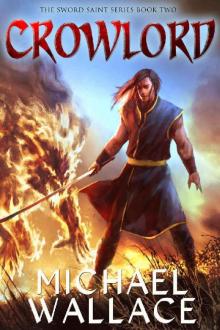 Crowlord (The Sword Saint Series Book 2)
Crowlord (The Sword Saint Series Book 2) Crowlord
Crowlord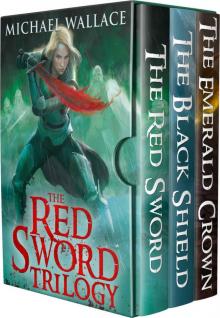 The Red Sword- The Complete Trilogy
The Red Sword- The Complete Trilogy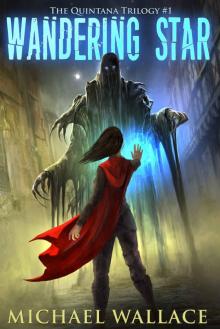 Wandering Star (The Quintana Trilogy Book 1)
Wandering Star (The Quintana Trilogy Book 1)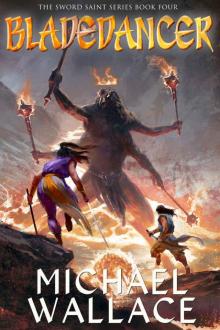 Bladedancer
Bladedancer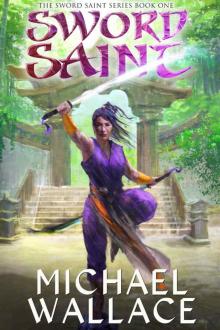 Sword Saint
Sword Saint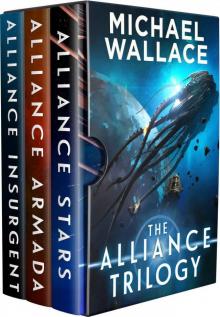 The Alliance Trilogy
The Alliance Trilogy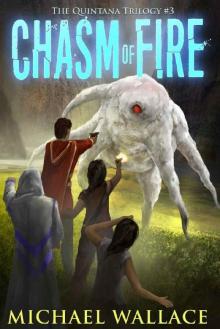 Chasm of Fire
Chasm of Fire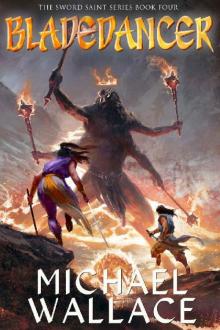 Bladedancer (The Sword Saint Series Book 4)
Bladedancer (The Sword Saint Series Book 4)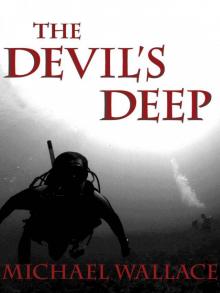 The Devil's Deep
The Devil's Deep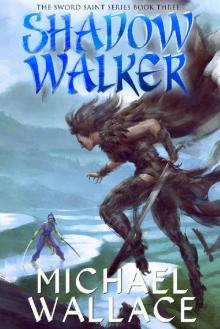 Shadow Walker (The Sword Saint Series Book 3)
Shadow Walker (The Sword Saint Series Book 3)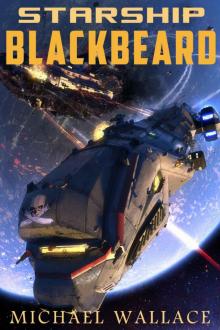 Starship Blackbeard
Starship Blackbeard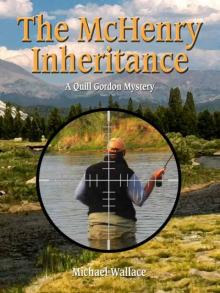 The McHenry Inheritance (Quill Gordon Mystery Book 1)
The McHenry Inheritance (Quill Gordon Mystery Book 1)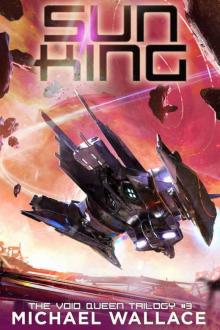 Sun King (The Void Queen Trilogy Book 3)
Sun King (The Void Queen Trilogy Book 3)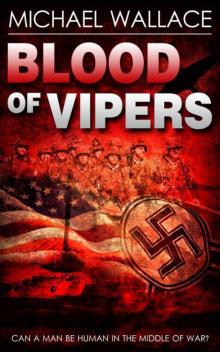 Blood of Vipers
Blood of Vipers Righteous - 01 - The Righteous
Righteous - 01 - The Righteous I Scarce Can Die (Quill Gordon Mystery Book 5)
I Scarce Can Die (Quill Gordon Mystery Book 5)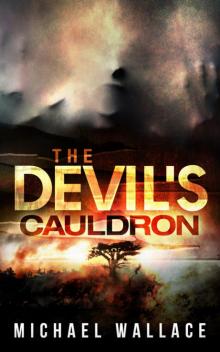 The Devil's Cauldron
The Devil's Cauldron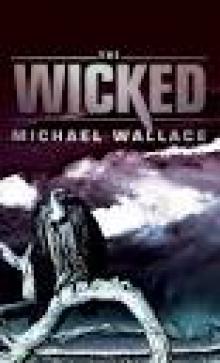 The Wicked (The Righteous)
The Wicked (The Righteous) Crow Hollow
Crow Hollow Righteous03 - The Wicked
Righteous03 - The Wicked Righteous02 - Mighty and Strong
Righteous02 - Mighty and Strong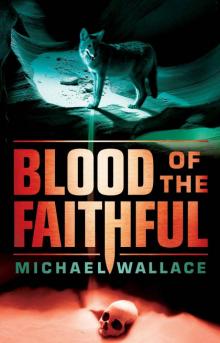 Blood of the Faithful
Blood of the Faithful Wash Her Guilt Away (Quill Gordon Mystery Book 2)
Wash Her Guilt Away (Quill Gordon Mystery Book 2) The Kingdom of the Bears
The Kingdom of the Bears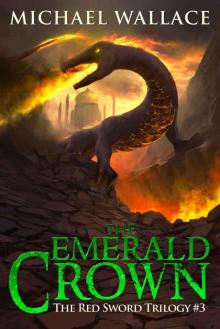 The Emerald Crown (The Red Sword Trilogy Book 3)
The Emerald Crown (The Red Sword Trilogy Book 3)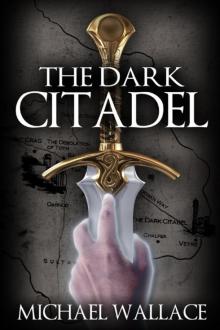 The Dark Citadel
The Dark Citadel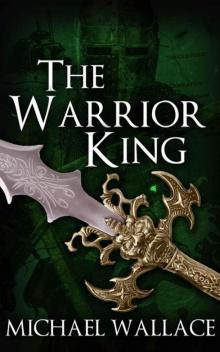 The Warrior King (Book 4)
The Warrior King (Book 4)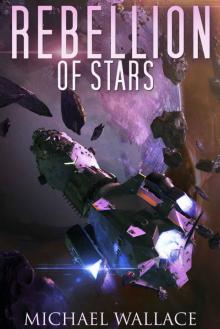 Rebellion of Stars (Starship Blackbeard Book 4)
Rebellion of Stars (Starship Blackbeard Book 4) Righteous04 - The Blessed and the Damned
Righteous04 - The Blessed and the Damned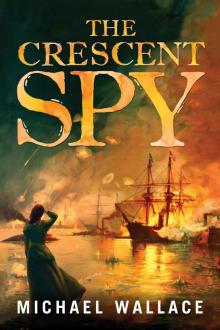 The Crescent Spy
The Crescent Spy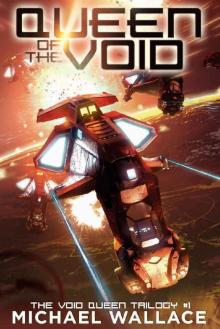 Queen of the Void (The Void Queen Trilogy Book 1)
Queen of the Void (The Void Queen Trilogy Book 1)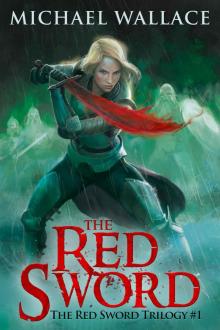 The Red Sword (The Red Sword Trilogy Book 1)
The Red Sword (The Red Sword Trilogy Book 1)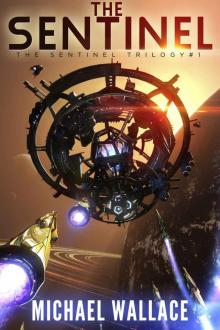 The Sentinel (The Sentinel Trilogy Book 1)
The Sentinel (The Sentinel Trilogy Book 1) The Golden Griffin (Book 3)
The Golden Griffin (Book 3) The Blessed and the Damned (Righteous Series #4)
The Blessed and the Damned (Righteous Series #4)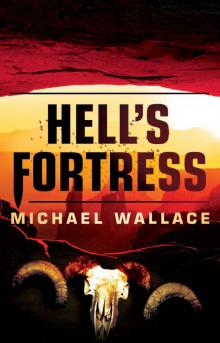 Hell's Fortress
Hell's Fortress Not Death, But Love (Quill Gordon Mystery Book 3)
Not Death, But Love (Quill Gordon Mystery Book 3) Destroying Angel
Destroying Angel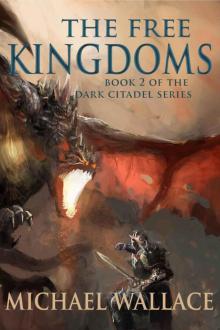 The Free Kingdoms (Book 2)
The Free Kingdoms (Book 2)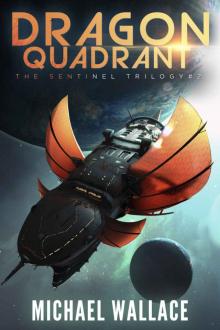 Dragon Quadrant (The Sentinel Trilogy Book 2)
Dragon Quadrant (The Sentinel Trilogy Book 2)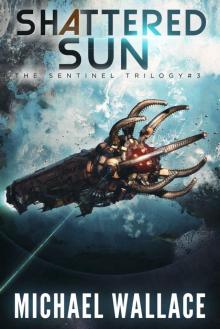 Shattered Sun (The Sentinel Trilogy Book 3)
Shattered Sun (The Sentinel Trilogy Book 3) The Wolves of Paris
The Wolves of Paris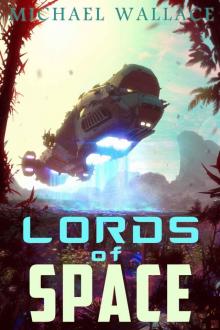 Lords of Space (Starship Blackbeard Book 2)
Lords of Space (Starship Blackbeard Book 2)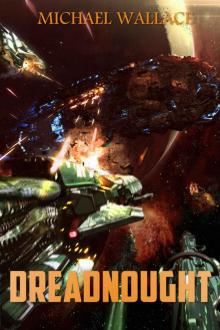 Dreadnought (Starship Blackbeard Book 3)
Dreadnought (Starship Blackbeard Book 3) The Village of Dead Souls: A Zombie Novel
The Village of Dead Souls: A Zombie Novel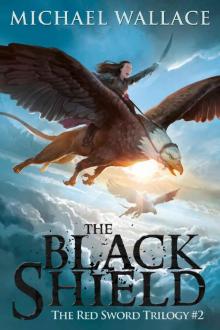 The Black Shield (The Red Sword Book 2)
The Black Shield (The Red Sword Book 2) The Daughters Of Alta Mira (Quill Gordon Mystery Book 4)
The Daughters Of Alta Mira (Quill Gordon Mystery Book 4) Mighty and Strong (The Righteous)
Mighty and Strong (The Righteous)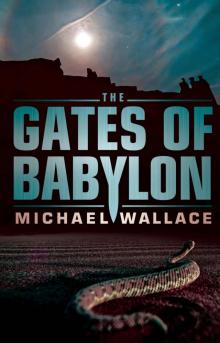 The Gates of Babylon
The Gates of Babylon